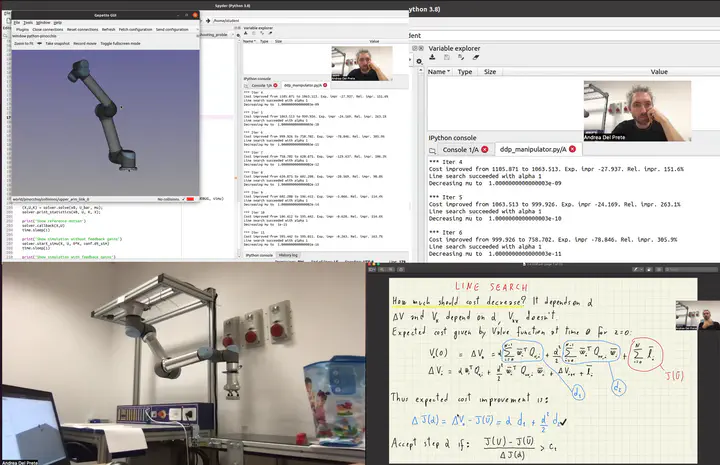
Industrial Engineering Department, since 2020, University of Trento (Trento, Italy)
A 48-hour course for master students. This course focuses on control of robotic systems, with special attention to methods based on optimization techniques. After reviewing the basic principles of robot modeling and numerical optimization, students will learn different control techniques, from the simplest and most well-known, to the most recent and advanced. Methods will be first studied in theory, and then implemented in simulation (with the Python language) to gain practical experience. The lab sessions will focus on industrial manipulators and legged robots, but most of the studied methods could also be applied to flying and wheeled robots. After completing the course, students will be able to:
- understand the working principles of several control algorithms for robotic systems
- choose the appropriate approach(es) to control a specific system for a given target application
- implement, tune, and test control algorithms with the Python language
Using the links above you can find videos and slides of all the lectures recorded in 2022. Since 2023, the suggested environment for coding has switched to docker. Installation instructions can be found here.
Content
The course includes approximately 32 hours of lectures (program below) and 16 hours of programming exercises.
Reactive Control
- Review of robot kinematics, Jacobian, statics, Lagrangian dynamics
- Joint motion control: PID, PD+gravity compensation, inverse dynamics
- Task-space motion control
- Impedance control
- Quadratic-Programming based control
Optimal Control
- Global approaches: Dynamic Programming and Hamilton-Jacobi-Bellman Equation
- Local approaches: Pontryagin’s Principle and direct methods
- Direct methods: single shooting, multiple shooting and collocation
- Numerical integration methods
- Differential Dynamic Programming
- Model Predictive Control: recursive feasibility, stability
Reinforcement Learning
- Markov Decision Processes
- Dynamic Programming: Value and policy iteration
- Prediction with Monte Carlo and Temporal Difference learning
- Q-learning
- SARSA
- Value function approximation
- Deep Q-Network
Prerequisite
Students should have consolidated knowledge in
- Mechanics: Newtonian dynamics in 3D, homogeneous transformation for expressing vectors in different frames
- Mathematics: linear algebra (eigenvalues, eigenvectors, rank, nullspace), multivariable differential calculus
- Systems: state space representation, stability criteria for linear dynamical systems
- Programming: object-oriented programming (if-else, for, while, objects, polymorphism)